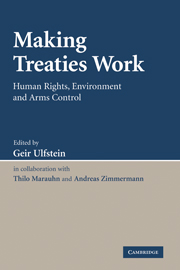Book contents
- Frontmatter
- Contents
- Preface and acknowledgments
- Notes on the contributors
- Table of cases
- Table of treaties and other international instruments
- INTRODUCTION
- PART I INTERNATIONAL HUMAN RIGHTS
- PART II INTERNATIONAL ENVIRONMENTAL LAW
- 5 Dispute resolution, compliance control and enforcement in international environmental law
- 6 The Convention on International Trade in Endangered Species of Wild Fauna and Flora (CITES)
- 7 The Convention on Long-Range Transboundary Air Pollution
- 8 The Convention on Access to Information, Public Participation in Decision-Making and Access to Justice in Environmental Matters (Aarhus Convention)
- 9 The Convention on Environmental Impact Assessment in a Transboundary Context (Espoo Convention)
- PART III INTERNATIONAL ARMS CONTROL
- GENERAL COMMENTS
- Index
8 - The Convention on Access to Information, Public Participation in Decision-Making and Access to Justice in Environmental Matters (Aarhus Convention)
Published online by Cambridge University Press: 05 September 2009
- Frontmatter
- Contents
- Preface and acknowledgments
- Notes on the contributors
- Table of cases
- Table of treaties and other international instruments
- INTRODUCTION
- PART I INTERNATIONAL HUMAN RIGHTS
- PART II INTERNATIONAL ENVIRONMENTAL LAW
- 5 Dispute resolution, compliance control and enforcement in international environmental law
- 6 The Convention on International Trade in Endangered Species of Wild Fauna and Flora (CITES)
- 7 The Convention on Long-Range Transboundary Air Pollution
- 8 The Convention on Access to Information, Public Participation in Decision-Making and Access to Justice in Environmental Matters (Aarhus Convention)
- 9 The Convention on Environmental Impact Assessment in a Transboundary Context (Espoo Convention)
- PART III INTERNATIONAL ARMS CONTROL
- GENERAL COMMENTS
- Index
Summary
Introduction
The Convention on Access to Information, Public Participation in Decision-Making and Access to Justice in Environmental Matters (the ‘Aarhus Convention’) was adopted at the Fourth Ministerial ‘Environment for Europe’ Conference in Aarhus, Denmark, on 25 June 1998, and signed by thirty-five countries and the EC. The Russian Federation, as well as Canada and the USA (which are members of the United Nations Economic Commission for Europe (UN/ECE)) are among the non-signatory States that have not ratified or otherwise acceded to the Convention at a later stage. The Aarhus Convention entered into force on 30 October 2001. The first Meeting of the Parties (MoP) was held in Lucca, Italy, in October 2002, and the second MoP in Almaty, Kazakhstan, in May 2005. The Convention has (as at October 2006) thirty-nine contracting parties, among them most of the twenty-five EC countries. The majority of the remaining contracting parties are Central and Eastern European countries. The Convention may, in addition to States being members of the ECE, or having consultative status with the ECE, and economic integration organizations, be acceded to by any State that is a member of the UN upon approval by the MoP.
An Extraordinary MoP of the Aarhus Convention, held within the framework of the Fifth Ministerial ‘Environment for Europe’ Conference (Kiev, May 2003), adopted the Protocol on Pollutant Release and Transfer Registers (the ‘2003 PRTR Protocol’). The Protocol was signed by thirty-six States and the EC.
- Type
- Chapter
- Information
- Making Treaties WorkHuman Rights, Environment and Arms Control, pp. 179 - 217Publisher: Cambridge University PressPrint publication year: 2007
- 6
- Cited by



